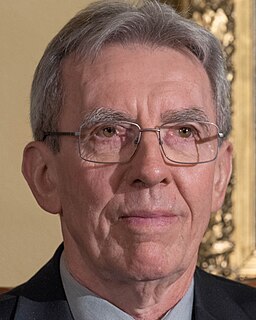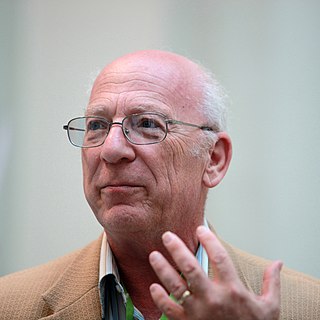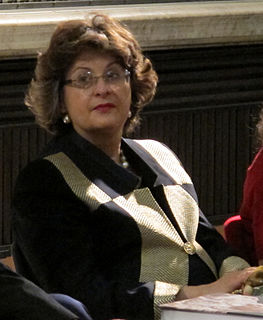
Karl Barry Sharpless is an American chemist and Nobel Laureate known for his work on stereoselective reactions and click chemistry.

Jean-Marie Lehn is a French chemist. He received the Nobel Prize in Chemistry together with Donald Cram and Charles Pedersen in 1987 for his synthesis of cryptands. Lehn was an early innovator in the field of supramolecular chemistry, i.e., the chemistry of host–guest molecular assemblies created by intermolecular interactions, and continues to innovate in this field. As of January 2006, his group has published 790 peer-reviewed articles in chemistry literature.

Jean-Pierre Sauvage is a French coordination chemist working at Strasbourg University. He graduated from the National School of Chemistry of Strasbourg, in 1967. He has specialized in supramolecular chemistry for which he has been awarded the 2016 Nobel Prize in Chemistry along with Sir J. Fraser Stoddart and Bernard L. Feringa.

Sir David William Cross MacMillan is a Scottish chemist and the James S. McDonnell Distinguished University Professor of Chemistry at Princeton University, where he was also the chair of the Department of Chemistry from 2010 to 2015. He shared the 2021 Nobel Prize in Chemistry with Benjamin List "for the development of asymmetric organocatalysis".

Barry M. Trost is an American chemist who is the Job and Gertrud Tamaki Professor Emeritus in the School of Humanities and Sciences at Stanford University. The Tsuji-Trost reaction and the Trost ligand are named after him. He is prominent for advancing the concept of atom economy.

Krzysztof "Kris" Matyjaszewski is a Polish-American chemist. He is the J.C. Warner Professor of the Natural Sciences at the Carnegie Mellon University Matyjaszewski is best known for the discovery of atom transfer radical polymerization (ATRP), a novel method of polymer synthesis that has revolutionized the way macromolecules are made.
Franz-Ulrich Hartl is a German biochemist and Managing Director of the Max Planck Institute of Biochemistry. He is known for his pioneering work in the field of protein-mediated protein folding and is a recipient of the 2011 Lasker Award along with Arthur L. Horwich.
Michael Lawrence KleinNAS is Laura H. Carnell Professor of Science and Director of the Institute for Computational Molecular Science in the College of Science and Technology at Temple University in Philadelphia, USA. He was previously the Hepburn Professor of Physical Science in the Center for Molecular Modeling at the University of Pennsylvania. Currently, he serves as the Dean of the College of Science and Technology and has since 2013.

Sir Christopher Martin Dobson was a British chemist, who was the John Humphrey Plummer Professor of Chemical and Structural Biology in the Department of Chemistry at the University of Cambridge, and Master of St John's College, Cambridge.

The European Medal for Bio-Inorganic Chemistry, also called the EUROBIC Medal or EUROBIC Award, was founded after the first European Biological Inorganic Chemistry Conference (EUROBIC-1), held in Newcastle, UK, in 1992. In 1993 a basic endowment was raised and is kept by the Royal Society of Chemistry.
Michael F. Brown is an American chemist. Since 1987, he has been a Professor of Chemistry at the University of Arizona, and since 2003 has held joint appointments as a Professor of Physics and Professor of Applied Mathematics. Prior to the University of Arizona, Brown earned tenure at the University of Virginia. His research involves the application of NMR spectroscopy and other biophysical methods to study membrane lipids, liquid crystals, and membrane proteins. Brown has particularly been a pioneer in the application of solid-state NMR spectroscopy to the study of lipid bilayer dynamics.
Christopher Jaroniec is an American professor of analytical, physical, chemical physics and biochemistry.
Nicola Maria Pugno is an Italian professor and scientist, a full professor of solid and structural mechanics at the University of Trento and of materials science at the Queen Mary University of London.

Cristina Acidini is an Italian author and art historian. Her name also appears as Cristina Acidini Luchinat. She is the former Superintendent of Museum and Artistic Heritage State Board for the Florence area from 1991 to 1999.
Hans Bernhard "Berny" Schlegel is German-born computational and theoretical chemist, and distinguished professor at Wayne State University. He is one of the most cited chemists in the world, with a Thomson Reuters H-Index of 116 and citations of over 218,000 as of 2020. He is a professor of chemistry at the Wayne State University and co-author of the computational chemistry software, Gaussian. The "Berny optimization" as implemented in Gaussian is named after him. His group also created the Electronic Structure Perl Toolkit (ESPT).
Alessio Ciulli is an Italian British biochemist. Currently, he is the Professor of Chemical & Structural Biology at the School of Life Sciences, University of Dundee, when he founded and directs Dundee' new Centre for Targeted Protein Degradation (CeTPD). He is also the scientific co-founder and advisor of Amphista Therapeutics.

David S. Wishart is a Canadian researcher and a Distinguished University Professor in the Department of Biological Sciences and the Department of Computing Science at the University of Alberta, where he has been since 1995. Wishart also holds cross appointments in the Faculty of Pharmacy and Pharmaceutical Sciences and the Department of Laboratory Medicine and Pathology in the Faculty of Medicine and Dentistry. Additionally, Wishart holds a joint appointment in metabolomics at the Pacific Northwest National Laboratory in Richland, Washington. Wishart is well known for his pioneering contributions to the fields of protein NMR spectroscopy, bioinformatics, cheminformatics and metabolomics. In 2011, Wishart founded and currently serves as a co-director of the Metabolomics Innovation Centre (TMIC), which is Canada's national metabolomics laboratory.
Marina Guenza is an Italian theoretical physical chemist who studies the fluid dynamics of macromolecules. She is a professor of chemistry and biochemistry at the University of Oregon.
Juri Rappsilber is a German chemist in the area of mass spectrometry and proteomics.
Arne Thomas is a German chemist who researches porous and nanostructured materials for catalytic applications.










